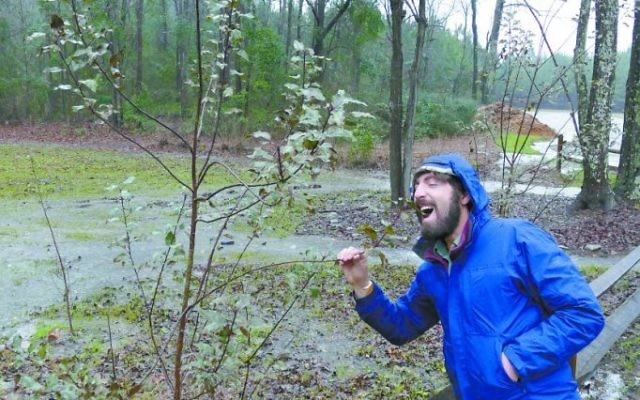Tu B’Shevat to Be Fruitful for Marcus JCC
By R.M. Grossblatt
The Marcus Jewish Community Center is marking Tu B’Shevat by adding something new to its traditional lineup of recreation, education, socialization and other services: a community orchard.
Arabia Mountain National Heritage Area Ranger Robby Astrove, who has planted about 50 orchards the past six years and last year launched Fruit Forward Orchards to put fruit trees throughout the Atlanta area, will help youths plant 15 fruit trees at the Marcus JCC’s Dunwoody campus at 4 p.m. Sunday, Jan. 24, outside the Barbara and Sanford Orkin Teen House. Tu B’Shevat, the new year of the trees, is the next day.

“We are very excited to be partnering with Fruit Forward and thrilled that they are donating trees to help the MJCC commemorate Tu B’Shevat,” said Cheri Lewis, public relations and communications manager at the center.
Astrove credited Jonathan Tescher of Farm to Table, the founder of Sparta Imperial Mushrooms, for a fundraising dinner at The Temple in December that supported orchard planting. He also gave credit to Georgia Interfaith Power & Light for helping to sponsor the event.
GIPL calls the tree planting at the Marcus JCC “Georgia’s first faith-based orchard.”
The small orchard will honor GIPL’s founding board members: the Rev. Woody Bartlett, Gary Harris, Marti Breen, Renee Kastanakis and Noah Levine.
“It’s a meaningful way rather than a plaque to honor our founders for their vision and leadership,” said the Rev. Kate McGregor Mosley, the executive director of GIPL.
The faith-based environmental group has helped over 500 congregations become more aware of conservation and sustainability practices, enabling them to reduce their energy use and costs. Last March, GIPL awarded Young Israel of Toco Hills the Gippy Award for Congregation of the Year for the construction and sustainability of its new building.
Now, McGregor Mosley said, GIPL is encouraging congregations and community centers to help solve the “food desert” problem by planting edibles.
Food deserts are areas where people lack access in their neighborhoods to healthy, affordable food, especially fruits and vegetables. McGregor Mosley said GIPL supports the efforts of rabbis to bring more edible landscapes to their places of worship.
“What if every congregation in Atlanta planted edibles?” she said.
Although he recognizes that many faith communities have feeding programs, Astrove supports GIPL’s efforts to solve the food desert problem. He said fruit trees surrounding places of worship “will last for decades and produce hundreds and hundreds of pounds of fruit effortlessly.”
The 15 trees being planted at the Marcus JCC — a mix of apple, pear, persimmon and plum trees — will need time to mature.
“While the fruit trees offer beautification for the JCC campus, they will, over time, grow food for families,” GIPL’s executive director said.
According to orlah, a complex Jewish law, the fruit of trees shouldn’t be eaten for the first three years of growth. In tune with the sensitivity of this law, Astrove said that as an ecologist and arborist he has “learned so much about patience and waiting.”
He added that planting trees is who he is as a person, connecting him to his culture, which thus gives him “another excuse to plant.”
On eruv Tu B’Shevat, Astrove will show JCC teens how to plant fruit trees. He sees the youth service project as a rite of passage for them. One participant is planting fruit trees for his bar mitzvah project.
“It’s hope for the future,” Astrove said.




comments